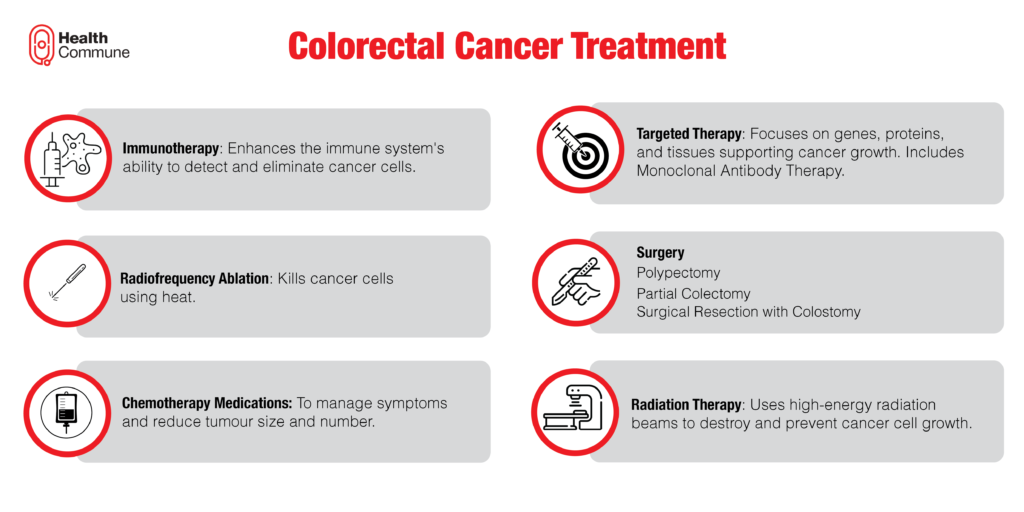Colorectal cancer is the most prevalent form of gastrointestinal cancer affecting both men and women in India and worldwide. However, it is highly treatable, particularly if detected in its early stages. In fact, individuals with localised tumours have a 5-year survival rate of over 90%. This article discusses in detail the causes, risk factors, symptoms screening, and treatment of colorectal cancer.
What is colorectal cancer?
Colorectal cancer usually begins in the colon, the longest part of the large intestine or in the rectum, the part of the digestive tract that opens into the anus. Most of the cases occur among the elderly. The first sign of colon cancer is the formation of small non-cancerous growths called polyps within the colon. These polyps can eventually develop into colorectal cancer.
What causes colorectal cancer?
- Normally, the old cells in our body are replaced continuously by new cells. These cells divide and grow in an organised fashion while maintaining their physiological function.
- Colorectal cancer is caused by defects in the DNA of cells that result in their excess and abnormal multiplication.
- The cancerous cells encroach adjacent normal body areas and get deposited in other parts of the body, continuing their abnormal multiplication there as well (metastasis).
What are the risk factors for colorectal cancer?
- Older age (over 50 years of age)
- Inflammatory conditions of the intestine like Crohn’s disease, and ulcerative colitis.
- Certain conditions such as Hereditary polyposis syndromes, Familial polyposis, Gardner syndrome, Turcot syndrome, and Peutz-Jeghers syndrome
- Positive family history of colon cancer
- History of radiation to the pelvic region
- The presence of genetic mutations as seen in
- Lynch syndrome
- Familial adenomatous polyposis (FAP)
- A high-calorie diet that is high in animal proteins and saturated fats; but lacking in fibre
- Heavy use of alcohol
- Smoking
- Sedentary lifestyle and obesity
- Previous history of endometrial or ovarian cancer
What are the signs and symptoms of colorectal cancer?
The symptoms include:
- A shift in your regular bowel habits
- Constipation, diarrhoea, or a sense that the bowels do not empty completely
- Blood in the stool
- Persistent cramps, aches, or pain in the abdomen
- Unexplained weight loss
- Weakness and fatigue
- Anaemia
What are the stages of colorectal cancer?
The various stages of colorectal cancer include:
- Stage 0: This stage also known as carcinoma in situ, which is the earliest stage. Only the inner layer of the colon or rectum is affected
- Stage 1: The malignancy has penetrated the rectum or colon’s inner layer but has not spread beyond the inner walls
- Stage 2: Cancer has spread to the inner wall of the colon but has not penetrated the lymph nodes
- Stage 3: Cancer has affected nearby lymph nodes, but not other organs
- Stage 4: Distant organs like the liver and lungs are affected
What are the screening tests for colorectal cancer?
The most frequent screening procedure for colorectal cancer is a colonoscopy. Other procedures include:
- The FIT (faecal immunochemical test) looks for undetected blood in your stools. Pathologists examine your stool under a microscope for blood
- Guaiac-based faecal occult blood test (gFOBT) is similar to the FIT, but uses a chemical reaction to look for microscopic blood in stool
- Fecal DNA testing is another test that detects blood in the stool and additionally detects DNA mutations found in cancerous and precancerous lesions with high accuracy
- Flexible sigmoidoscopy helps to view your lower colon and rectum using a thin, flexible tube called a sigmoidoscope
- Virtual colonoscopy is an X-ray that scans your colon and rectum for polyps, tumours, and ulcers (sores)
How is colorectal cancer diagnosed?
The tests used for diagnosis include:
- A colonoscopy is a procedure where your colon and rectum can be examined for any abnormalities such as polyps, and bleeding. It consists of a colonoscope which is a long, thin, flexible tube with a camera attached at the end of it.
- Biopsy
- A small part of the suspected tissue is removed and evaluated under the microscope.
- Only a biopsy can provide a conclusive diagnosis of colorectal cancer; (other tests can just indicate the presence of malignancy)
- Examination of the tumour biomarkers helps identify genes, proteins, and other elements specific to the tumour. This can help confirm the diagnosis and plan the course of treatment
- Carcinoembryonic antigen (CEA) assay
- This measures the presence of a protein known as carcinoembryonic antigen (CEA) which is released by the cancer cells
- High levels of CEA could be a sign that malignancy has spread to different areas of the body
- Complete blood tests which can detect anaemia and help in monitoring your health
- Computed tomography (CT or CAT) or MRI scans create images of the interior of the body to find out any abnormalities or malignancies
- PET scan
- This test helps in identifying cancerous tissues using certain radioactive tracers.
- Cells that use high amounts of energy such as cancer cells, take up these tracers and are hence identified
What are the treatment methods for colorectal cancer?
The most often used treatment for colorectal cancer is surgery. There are various procedures for colorectal cancer which include:
- Polypectomy which removes cancerous polyps
- Partial colectomy
- It is also referred to as colon resection surgery
- The cancerous portions of the colon as well as some surrounding healthy tissue are surgically removed
- The remaining colon is connected to form healthy colon sections (a technique known as anastomosis)
- Surgical resection with a colostomy
- Similar to a colectomy, this procedure involves cutting off the tumour-containing portion of your colon
- However, instead of rejoining the remaining ends of the colon, a colostomy is done
- Your doctor creates an opening in the abdominal wall for the colon through which your stools are collected in a bag
- Radiofrequency ablation kills cancer cells using heat.
- Chemotherapy medications are used to treat colorectal cancer symptoms and decrease tumour size and number
- Targeted therapy treatment is directed at the genes, proteins, and tissues that support the development and growth of colorectal cancer cells. Monoclonal antibody therapy is a common form of targeted therapy used by healthcare professionals.
- Immunotherapy aids in the immune system’s detection and eradication of malignant cells
- Radiation therapy uses high-energy beam radiation to destroy and prevent the growth and multiplication of cancer cells

How can I prevent colorectal cancer?
You can reduce the risk factors for colorectal cancer by managing certain risk factors like:
- Avoid the use of tobacco and alcohol
- Maintain a healthy weight by eating healthy food and exercising frequently
- regular screening after the age of 45 years
- In cases of a significant family history, consult your doctor to know how you can safeguard yourself and your loved ones
What distinguishes a colorectal cancer diagnosis test from a screening test?
A screening test is relatively simple and helpful in detecting the presence or absence of risk factors for cancer or any abnormalities. It does not confirm the presence or absence of cancer. In case your screening test shows abnormalities, your doctor recommends additional testing that is more extensive (diagnostic tests) to confirm the diagnosis.





